The gender gap has been present for years at various levels of academia, especially in STEM disciplines. Although women have made great strides to increase their presence in higher education, they are still underrepresented in many fields. Every year on February 11, the International Day of Women and Girls in Science takes place. Established by the United Nations, this day is intended to draw attention to the fact that only a third of all researchers worldwide are women and that access to education and technology for girls and women must be better facilitated and promoted.1
Facts and Figures at Leibniz University Hannover
Despite gender equality being enshrined in law, gender-specific differences are unmissable at Leibniz University Hannover. In general, the proportion of women decreases with increasing academic career level. This visually creates a gap (see Fig. 1). The difference in gender proportions is greatest for professorships at grade C4/W3, with a 77% share of men.

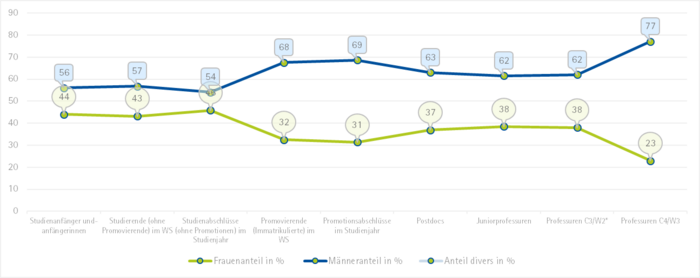
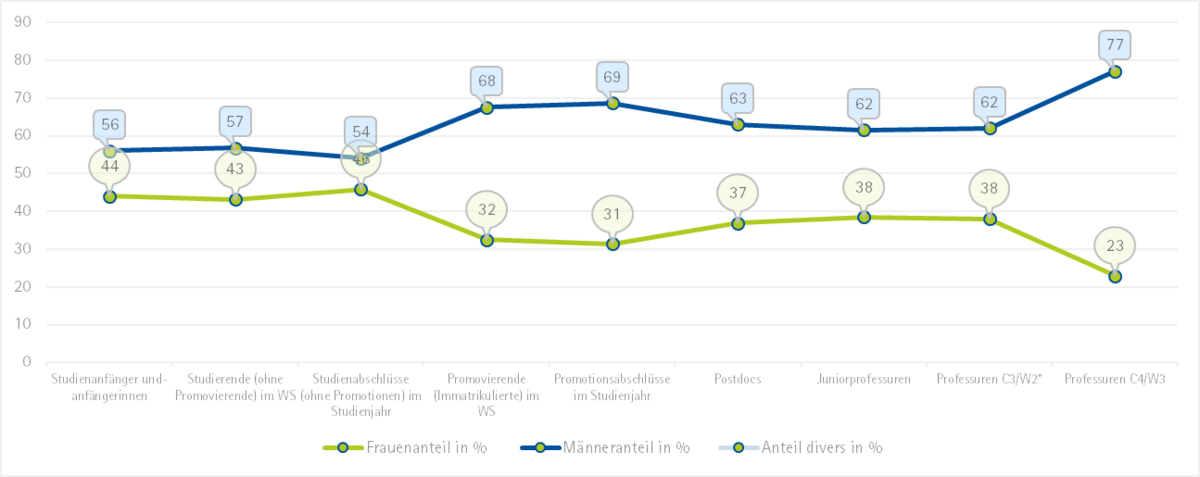
Just like the national average, the proportion of women in STEM disciplines is low at LUH. The proportion of female professors in the faculties has changed over the years. For example, a significant increase can be seen in the Faculty of Natural Sciences and the Faculty of Economics. In the traditional STEM fields, the proportion of female professors is significantly lower.
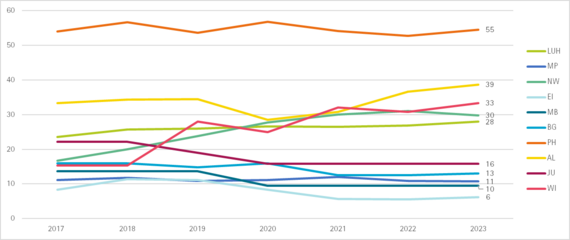
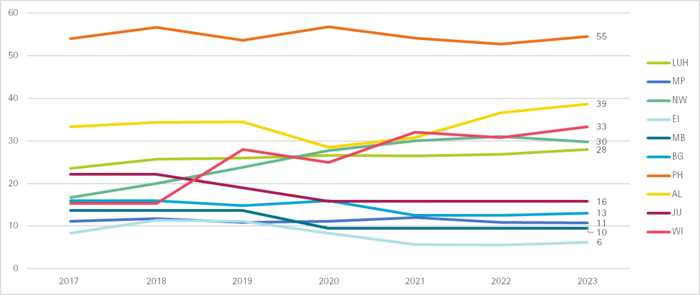
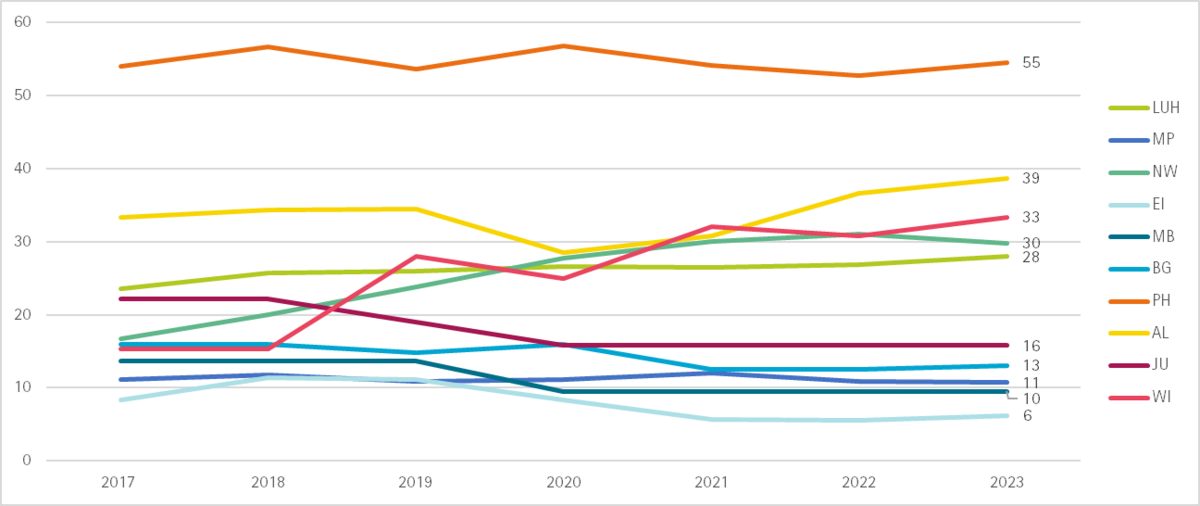
Gender bias in science
There are many reasons why women are not so strongly represented in science. Internalized stereotypes can play a decisive role. According to one study, attributes that are often attributed to men overlap strongly with the attributes for female scientists (e.g. “analytical” or “competitive”). In comparison, stereotypes about women (e.g. “empathetic” or “supportive”) hardly resemble those about scientists.2 The gender gap or gender bias is also evident in other studies:
-
Gender Publication Gap
- Male scientists publish am average of 13.2 articles over the course of their career, while female scientists publish only 9.6 articles. The difference in productivity is 27%.
- Men are cited 30% more often.
- To this end, 1.5 million authors in 83 countries and 13 disciplines were analysed.3
3 HUANG, J. & GATES, A. J. & Barabási, A.-L., 2020: Historical comparison of gender inequality in scientific careers across countries and disciplines. Proceedings of the National Academy of Sciences 117 (9): 4609-4616. https://www.pnas.org/doi/full/10.1073/pnas.1914221117
-
Collaboration Bias
- Male scientists tend to collaborate only with other male scientists. Most female scientists do not collaborate with other women at all.
- The international collaboration of all visible Polish female professors was analysed based on their Scopus-indexed publications from 2009-2018 (158,743 articles).4
4 WIEK, M. & ROSZKA, W., 2021: Gender-based homophily in research: A large-scale study of man-woman collaboration. Journal of Informetrics 15 (3). https://www.sciencedirect.com/science/article/pii/S1751157721000420?via%3Dihub
-
Prove-It-Again Bias
- In order for women to be seen as equally competent as their colleagues, they have to prove themselves more than men.
- Black women are even more affected by this bias than white women.5
5 WILLIAMS, J. C., 2014: Double Jeopardy? An Empirical Study with Implications for the Debates over Implicit Bias and Intersectionality. Harv. J.L. & Gender 185 (37). https://repository.uclawsf.edu/faculty_scholarship/1278/
-
Intersectionality
Intersectionality describes the interaction of several mechanisms of oppression and discrimination: e.g. racism, classism, homophobia, transophobia, ableism and sexism. Women of colour experience multiple forms of discrimination and are therefore even more underrepresented than white women in science. The 2019 Annual Report of the U.S. Equal Opportunity Commission shows that the majority of women working in STEM fields are white (66.02%).6 The educational opportunities for children with a migrant background in Germany are generally lower than for other children. Of students with a migrant background who successfully completed the German school system, 42% dropped out of their bachelor's degree programme in the 2020 graduation year. Among students with German citizenship, the proportion was only 28%. 7
Further information on intersectionality in STEM can be found here: Intersectionality in STEM.
6 U.S. EQUAL EMPLOYMENT OPPORTUNITY COMMISSION, o. J.: Special Topics Annual Report: Women in STEM. Supplement to the US Equal Employment Opportunity's Annual Report on the Federal Workforce Fiscal Year 2019. Aufgerufen am: 05.02.2025, https://www.eeoc.gov/special-topics-annual-report-women-stem#_Toc97287809
7 SACHVERSTÄNDIGENRAT FÜR INTEGRATION UND MIGRATION, 2024: Ungleiche Bildungschancen Fakten zur Benachteiligung von jungen Menschen mit Migrationshintergrund im deutschen Bildungssystem. Berlin. https://www.svr-migration.de/wp-content/uploads/2023/02/Kurz-und-buendig_Bildung_2024.pdf
1 VEREINTE NATIONEN, o. J.: Erklärung zum Internationalen Tag der Frauen und Mädchen in der Wissenschaft, 11. Februar. Aufgerufen am: 05.02.2025, https://unric.org/de/11022020-frauen-wissenschaft/
2 CARLI, L. L. et al., 2016: Stereotypes About Gender and Science: Women ≠ Scientists. Psychology of Women Quarterly 40 (2): 244-260. https://doi.org/10.1177/0361684315622645
Activities & offers from recent years
-
International Day of Women & Girls in Science, 2024
Women in Science Day takes place every year on 11 February. Established by the United Nations, this day aims to draw attention to the fact that only a third of all researchers worldwide are women and that access to education and technology for girls and women should be better facilitated and promoted.
These figures are also reflected at Leibniz University Hannover: 32% of female doctoral students, 35% of female postdocs and 36% of female scientists hold permanent positions in the field of science. The imbalance is even more pronounced at professorship level. Here, only 27% of professorships are held by women.
There are many female role models, for example the astronomer Caroline Herschel or Ilse ter Meer, one of the first German female mechanical engineers, who studied at the Technical University of Hanover. But there are other interesting female scientists at Leibniz Universität Hannover who are passionate about their research and use their findings to advance science. They want to encourage other women and girls to find their way into research and encourage them to follow this path consistently.



